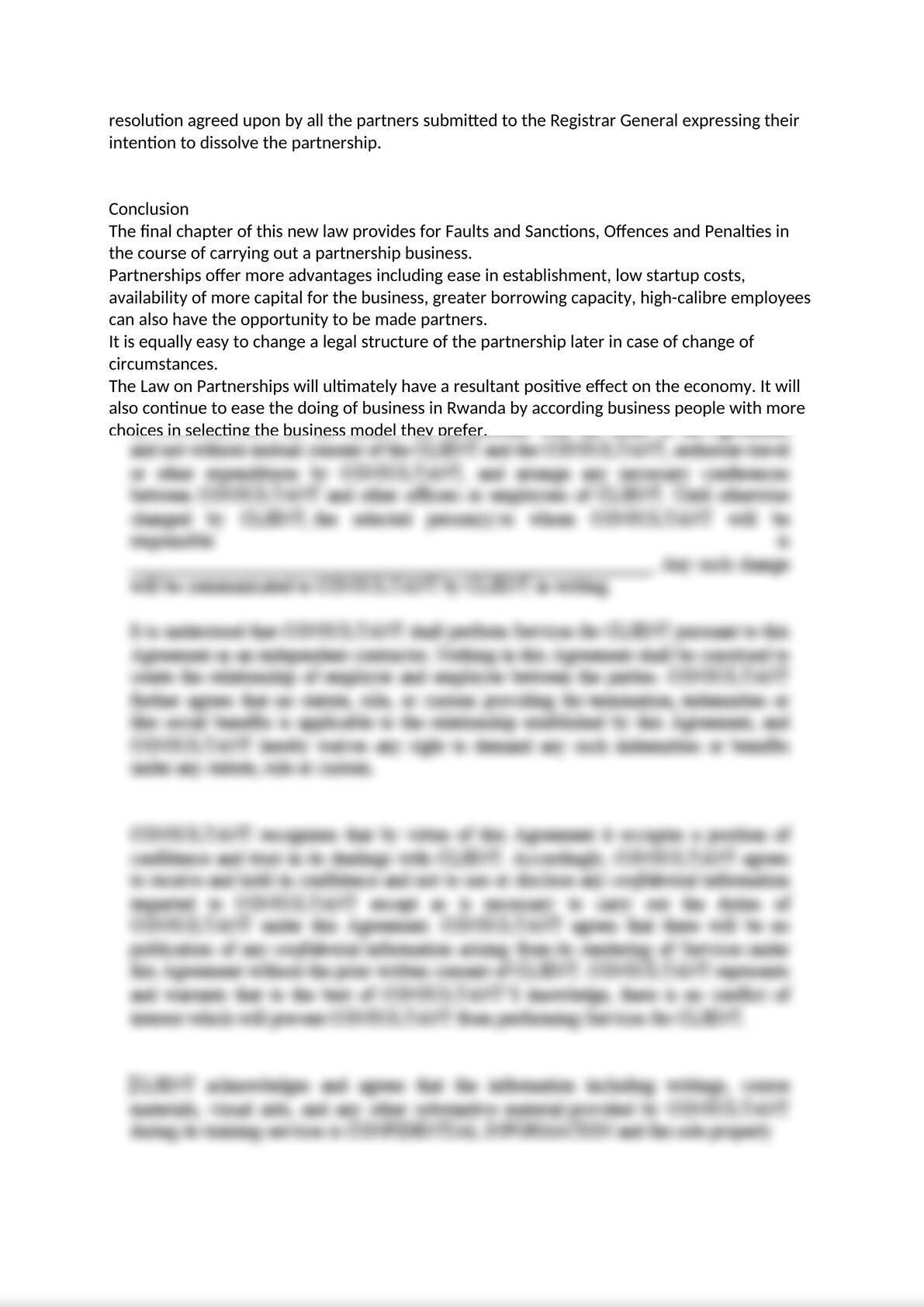A Guide to Company Law in Rwanda
Launching a venture in Rwanda can be an exhilarating yet tough journey. If you’re thinking about taking this route it’s essential to grasp the nuances of the company law. The country has made progress in enhancing its business landscape and its company law reflects that. Aimed at fostering entrepreneurship and upholding fairness this legal structure outlines the guidelines for establishing and operating a business in Rwanda. Familiarizing yourself with these regulations from registration to adherence can streamline your journey and help you steer clear of pitfalls.
Key Regulations and Framework

The company law in Rwanda is primarily governed by the Company Law No. 07/2009, which was updated by Law No. 30/2018. This framework sets out the legal requirements for business operations and ensures transparency and accountability. Here are some key aspects:
- Registration: All businesses must be registered with the Rwanda Development Board (RDB). This involves submitting required documents and paying the necessary fees.
- Corporate Governance: The law mandates specific governance practices, including the appointment of directors and the establishment of company bylaws.
- Financial Reporting: Companies are required to maintain accurate financial records and submit annual reports to regulatory bodies.
- Taxation: Companies must comply with Rwanda’s tax regulations, including corporate tax and VAT obligations.
Through my work with companies in Rwanda I’ve witnessed how these rules can either make things run smoothly or pose obstacles. Its crucial to keep yourself updated and seek advice from professionals to ensure adherence.
Types of Companies in Rwanda
Rwanda provides various company structures tailored to meet diverse business requirements. Knowing these choices can assist you in selecting the most suitable one for your enterprise. Here’s a quick summary
- Sole Proprietorship: Ideal for individual entrepreneurs, this structure is simple to set up and manage. However, the owner bears full liability for the company’s debts.
- Limited Liability Company (LLC): Popular among small to medium-sized enterprises, an LLC limits the liability of its owners. It requires at least one shareholder and one director.
- Public Limited Company (PLC): Suitable for larger businesses looking to raise capital through public shares. A PLC has more stringent regulatory requirements and must adhere to high standards of disclosure.
- Branch Office: Foreign companies can establish a branch office in Rwanda. This allows them to operate locally while remaining part of the parent company.
Selecting the kind of company to establish is a choice that can greatly influence how your business functions and expands. From my conversations with different business owners I suggest considering your objectives and seeking advice from a legal professional to help you make a well informed decision.
Company Registration Process
Starting a business in Rwanda might feel overwhelming at first, but getting a grip on the registration procedure can make it easier. The first step is to connect with the Rwanda Development Board (RDB) which is responsible for handling business registrations. Drawing from my experiences helping clients here is a breakdown of the steps involved in the process.
- Choose a Company Name: Ensure your desired company name is unique and complies with RDB’s guidelines. You can check name availability online.
- Prepare Required Documents: Gather necessary documents such as identification, proof of address, and company bylaws. If you’re forming an LLC or PLC, you’ll need to provide details about shareholders and directors.
- Submit Application: Complete the registration application form available on the RDB’s website or office. You’ll need to pay a registration fee at this stage.
- Obtain Business Registration Certificate: Once your application is approved, you’ll receive a Business Registration Certificate. This officially recognizes your company as a legal entity.
- Register for Tax: Register your company with the Rwanda Revenue Authority (RRA) for tax purposes. You’ll receive a Tax Identification Number (TIN).
- Open a Bank Account: Finally, open a company bank account using your registration certificate and TIN. This is necessary for managing your business finances.
Based on my journey I’ve found that having all the paperwork in order can speed things up. It’s a good idea to seek advice from a professional to help with any challenges that may arise.
Corporate Governance Standards
Corporate governance in Rwanda aims to promote transparency and accountability in business operations. It goes beyond being a legal obligation and plays a role in safeguarding a companys image. Drawing from my insights and encounters I would highlight the key aspects.
- Board of Directors: Companies must have a board of directors responsible for making strategic decisions. Directors are required to act in the best interests of the company and its stakeholders.
- Annual General Meetings (AGMs): Companies must hold AGMs to discuss financial performance and strategic plans with shareholders. This ensures transparency and accountability.
- Audit and Compliance: Regular audits are required to ensure financial statements are accurate and comply with legal standards. Companies must also adhere to internal controls and risk management practices.
- Corporate Social Responsibility (CSR): While not mandatory, engaging in CSR activities can enhance a company’s public image and build goodwill. Many companies in Rwanda actively participate in community development projects.
Through my interactions with businesses in the area I’ve witnessed the positive effects of solid corporate governance on a companys progress and resilience. Its not merely about adhering to regulations; its also about fostering trust and reliability.
Taxation and Financial Reporting
Grasping the nuances of Rwandas tax regulations and financial reporting obligations is crucial to ensure adherence and steer clear of any potential repercussions. Allow me to share a summary drawn from my knowledge and expertise.
- Corporate Tax: Companies in Rwanda are subject to a corporate tax rate of 30% on their taxable income. It’s important to file annual tax returns and make payments on time to avoid interest and penalties.
- Value Added Tax (VAT): If your company’s turnover exceeds a certain threshold, you must register for VAT. The standard rate is 18%. Regular VAT returns must be submitted to the Rwanda Revenue Authority (RRA).
- Financial Statements: Companies are required to prepare and submit audited financial statements annually. These statements must comply with international accounting standards.
- Record Keeping: Maintaining accurate financial records is crucial. Companies should keep all financial documents, such as invoices and receipts, for at least five years.
Based on what Ive seen being organized and getting guidance from a tax expert can really help. With preparation and meeting deadlines you can steer clear of unnecessary pressure and ensure your business operates seamlessly.
Compliance and Legal Obligations
Running a business in Rwanda goes beyond simply registering your company; it entails staying compliant with a range of legal responsibilities. Meeting these obligations is crucial to avoiding problems and fostering the growth of your venture. Drawing from my experiences here is a detailed overview of key considerations to remember.
- Employee Rights: Employers must adhere to labor laws, which include fair wages, working conditions, and employee rights. Regular updates on these laws are essential to avoid conflicts.
- Environmental Regulations: Businesses must comply with environmental laws that protect Rwanda’s natural resources. This may involve obtaining permits and following guidelines for waste management and pollution control.
- Health and Safety Standards: Ensuring a safe working environment is not just a legal obligation but also a moral one. Companies need to implement health and safety measures and provide training to employees.
- Data Protection: With data privacy becoming increasingly important, companies must comply with data protection laws, ensuring the secure handling of personal information.
- Reporting Requirements: Regular reporting to regulatory bodies, including financial reports and compliance certificates, is crucial. These reports help maintain transparency and build trust with stakeholders.
In my experience fulfilling these responsibilities is crucial for achieving lasting success. Regularly seeking guidance from legal experts and staying updated on legal developments can have an impact.
Dispute Resolution and Enforcement
Disagreements can happen, even with careful preparation. Rwanda provides various ways to settle conflicts, each with its own benefits. Drawing from my experiences with companies, here’s a summary of the main approaches.
- Mediation: This is a voluntary process where a neutral third party helps parties reach a mutually acceptable solution. It’s less formal than litigation and can save time and costs.
- Arbitration: Often preferred for commercial disputes, arbitration involves a neutral arbitrator who makes a binding decision. It’s generally faster and more flexible than court proceedings.
- Court Litigation: For more complex or contentious issues, court litigation might be necessary. The Rwandan judicial system handles business disputes, but it can be time-consuming and costly.
- Enforcement of Judgments: Once a dispute is resolved, enforcing the judgment is crucial. Rwanda’s legal system provides mechanisms for enforcing court orders or arbitration awards.
From what I have seen selecting the dispute resolution method hinges on the specifics of the conflict and the individuals or entities involved. It can be helpful to consult with a professional to figure out the best course of action.
Frequently Asked Questions
Here are a few frequently asked questions regarding corporate law in Rwanda that I come across quite often.
- What is the minimum capital requirement for starting a business in Rwanda? For an LLC, the minimum capital requirement is RWF 1 million. However, no minimum capital is required for sole proprietorships.
- How long does the company registration process take? Typically, the registration process takes about 5 to 10 business days if all documents are in order. However, it can vary based on the complexity of the application.
- Are there any special licenses required for specific industries? Yes, certain industries, such as pharmaceuticals or food processing, require additional licenses and permits. It’s essential to check with the relevant authorities.
- What are the penalties for non-compliance with company law? Penalties can include fines, suspension of business activities, or even legal action. Compliance is crucial to avoid these consequences.
- Can foreign investors own 100% of a Rwandan company? Yes, foreign investors can own 100% of a company, but they must comply with local regulations and may need to obtain additional approvals for certain sectors.
These frequently asked questions are here to give you an overview. If you need guidance it’s best to reach out to a lawyer for more specific and tailored support. From what I’ve seen tackling these common issues early on can prevent a lot of hassle, in the future.
Conclusion
Navigating the intricacies of corporate law in Rwanda can be a journey. Whether it’s grasping the registration process or ensuring compliance with legal requirements every aspect demands careful consideration. My experiences collaborating with businesses in Rwanda have taught me that although the legal environment may appear intimidating meticulous preparation and continuous vigilance can make a significant impact. By staying updated seeking guidance and following the regulatory framework you can position your venture for success. It’s important to remember that legal compliance isn’t solely about evading penalties; it’s also about establishing a strong groundwork for enduring growth and a positive reputation.


